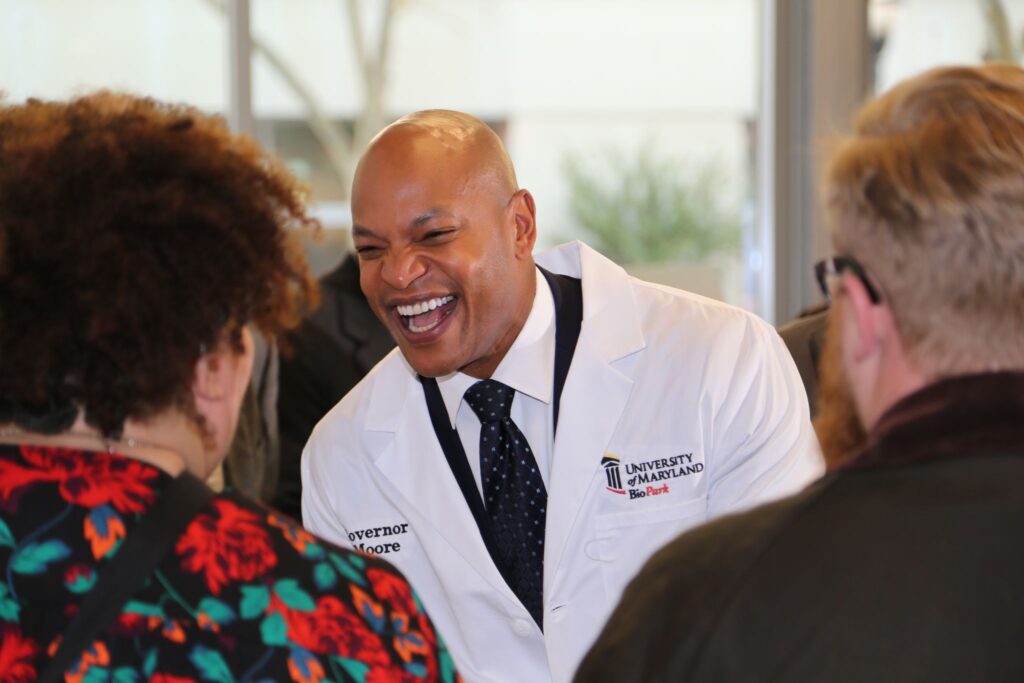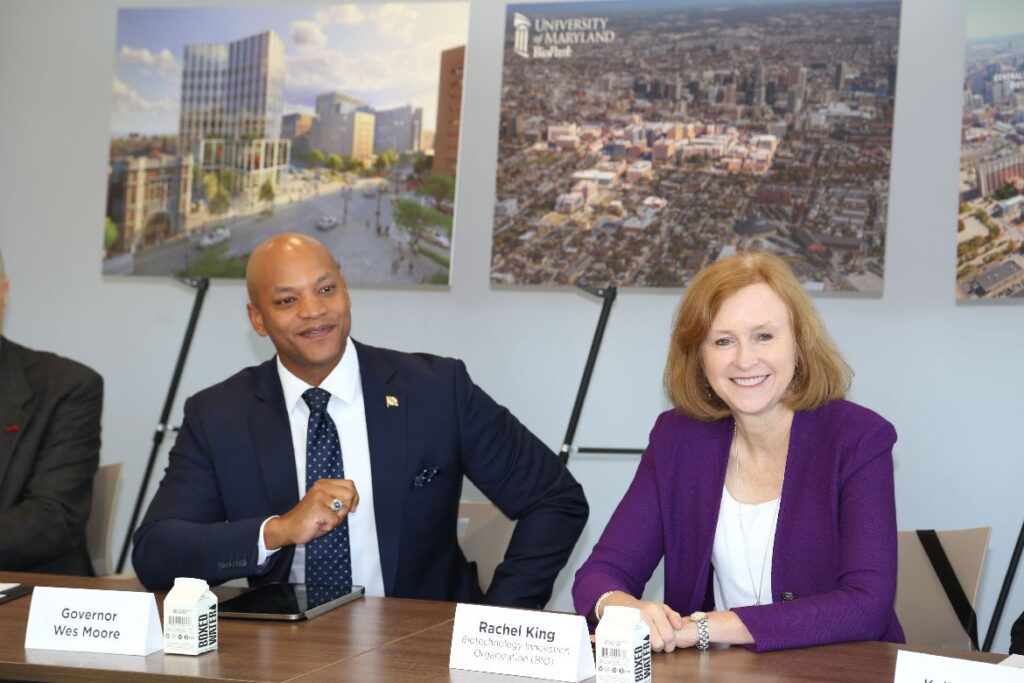Biotech was front and center as Biotechnology Innovation Organization (BIO) CEO Rachel King met with Maryland Governor Wes Moore at the University of Maryland BioPark in Baltimore. But biotech is always front and center in Maryland.
“Maryland right now is number three nationally in biopharma, and number two when it comes to life sciences,” said Gov. Moore.
Maryland had 3,104 bioscience industry establishments employing 49,945 workers with an average wage of $140,498 in 2021, according to a report published by BIO in June.
Gov. Moore, who was touring the BioPark, underlined the importance Maryland gives to supporting biotech during a conversation with BIO’s Rachel King.
“How can we be deliberate about making sure that we’re increasing access to capital for our small businesses and entrepreneurs? How can we make it easier for our business to grow? And that includes addressing things like regulatory red tape and how complicated it is for businesses to be able to grow and sustain,” he said. “It’s important to make sure that we make Maryland a better ecosystem for follow-on capital that you can provide to small businesses.”
King, who spent much of her career in biotech in Maryland, acknowledged the state’s efforts.
“I think Maryland is a great place to be an entrepreneur, in part because it’s a good place to start a business, but also because it’s a great place for people to live,” she said.
Emphasizing BIO’s commitment to help Maryland grow its biotech sector, King spoke of the work that Maryland has already put into place to make the state a secure home for the industry. Initiatives include support for innovation infrastructure, a focus on STEM education, the recent establishment of a Rare Disease Advisory Council, and the passage of a bill requiring coverage of biomarker testing.
“I love the idea of coming up with an overall strategy that we could work on together to really think collectively and broadly about what would be beneficial for the industry,” added King. “I know [Gov. Moore’s] got a lot of enthusiastic people here in the room who would be delighted to help contribute to that.”
How Maryland is building a bioeconomy
Maryland recently launched the Build Our Future grant program, a pilot program infused with $10 million in state funding to “provide matching grants of up to $2 million to projects that demonstrate a transformative impact in accelerating growth and innovation in the state’s strategic industry sectors,” according to Gov. Moore’s office.
“It’s not exclusively for businesses,” said Gov. Moore on October 10. “It’s saying, bring us your best ideas—whether they come from universities, whether they come from nonprofit organizations, social service organizations, whether they come from businesses, whether they come from large entities, bring us your best ideas when it comes to a growing economy that’s going to focus on elements of life sciences [and] on elements of biopharma. These are the things that we want to be able to fund.”
Another initiative Gov. Moore is excited about is the Maryland Economic Council, which aims to create better bonds between the private sector, government, and nonprofits.
“The Maryland Economic Council is really a first-of-its-kind council,” said Gov. Moore. “How do we take a macro understanding of economic trend lines and then break them down to the micro-investments that the state can then make?”
The University of Maryland BioPark

The Fireside Chat was part of the governor’s visit to and tour of the University of Maryland BioPark, a research park that accelerates biotechnology commercialization and economic development in the surrounding Baltimore community and throughout the region.
The visit highlighted the development of the 4MLK building, the newest addition to the Maryland BioPark. It’s being built at the intersection of Martin Luther King, Jr. Blvd. and Baltimore St.
“The 8-story, 250,000-square-foot building, Phase I of a two-phase project representing a $320 million total capital investment, will provide critical wet laboratory space in downtown Baltimore for researchers and companies, flexible lab and office/support space for start-ups, and Class A office space, along with areas for convening and a conference center,” according to the university.
“BioPark isn’t just a hub for discovering new, breakthrough treatments and cures–it’s also a key piece of our state’s economic engine,” said Gov. Moore.
Maryland and biotech go together
“BIO appreciates the continued focus of Governor Moore and the General Assembly on biotech’s revolutionary potential and the innovation ecosystem that delivers for patients and people everywhere,” said King. “During my career in biotech, I’ve witnessed incredible growth in Maryland life sciences. That progress stems from a talented workforce, supportive infrastructure, and a commitment from public officials and business leaders to work together to spur lifesaving and life-changing innovation here in Maryland.”
King noted the benefits that biotech brings to Maryland.
“The industry provides something like $20 billion to the state of Maryland,” concluded King. “I think we not only can improve people’s lives, but through the work that we do, we can also improve the economy through the contributions that the industry can make.”




